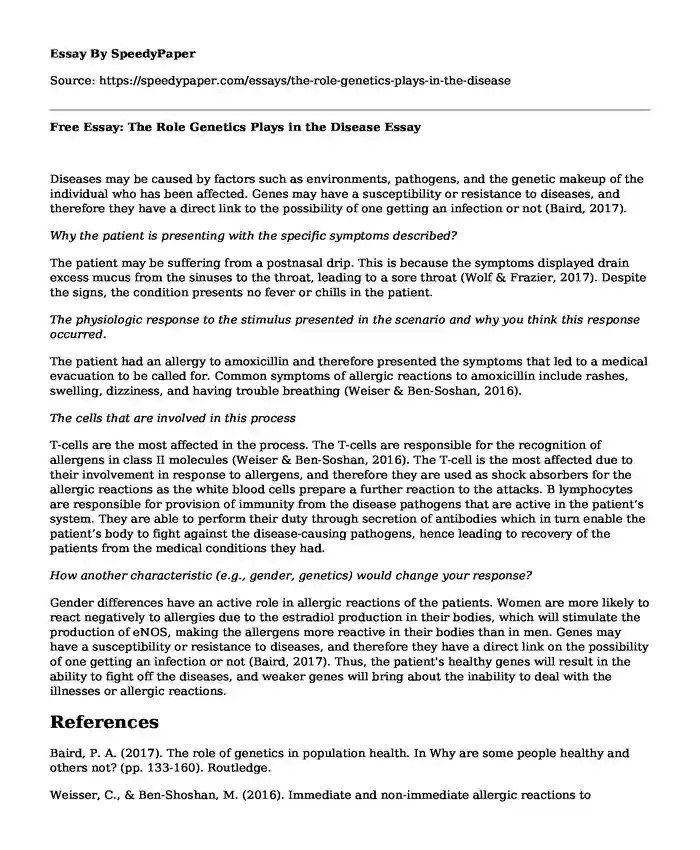Diseases may be caused by factors such as environments, pathogens, and the genetic makeup of the individual who has been affected. Genes may have a susceptibility or resistance to diseases, and therefore they have a direct link to the possibility of one getting an infection or not (Baird, 2017).
Why the patient is presenting with the specific symptoms described?
The patient may be suffering from a postnasal drip. This is because the symptoms displayed drain excess mucus from the sinuses to the throat, leading to a sore throat (Wolf & Frazier, 2017). Despite the signs, the condition presents no fever or chills in the patient.
The physiologic response to the stimulus presented in the scenario and why you think this response occurred.
The patient had an allergy to amoxicillin and therefore presented the symptoms that led to a medical evacuation to be called for. Common symptoms of allergic reactions to amoxicillin include rashes, swelling, dizziness, and having trouble breathing (Weiser & Ben-Soshan, 2016).
The cells that are involved in this process
T-cells are the most affected in the process. The T-cells are responsible for the recognition of allergens in class II molecules (Weiser & Ben-Soshan, 2016). The T-cell is the most affected due to their involvement in response to allergens, and therefore they are used as shock absorbers for the allergic reactions as the white blood cells prepare a further reaction to the attacks. B lymphocytes are responsible for provision of immunity from the disease pathogens that are active in the patient’s system. They are able to perform their duty through secretion of antibodies which in turn enable the patient’s body to fight against the disease-causing pathogens, hence leading to recovery of the patients from the medical conditions they had.
How another characteristic (e.g., gender, genetics) would change your response?
Gender differences have an active role in allergic reactions of the patients. Women are more likely to react negatively to allergies due to the estradiol production in their bodies, which will stimulate the production of eNOS, making the allergens more reactive in their bodies than in men. Genes may have a susceptibility or resistance to diseases, and therefore they have a direct link on the possibility of one getting an infection or not (Baird, 2017). Thus, the patient's healthy genes will result in the ability to fight off the diseases, and weaker genes will bring about the inability to deal with the illnesses or allergic reactions.
References
Baird, P. A. (2017). The role of genetics in population health. In Why are some people healthy and others not? (pp. 133-160). Routledge.
Weisser, C., & Ben-Shoshan, M. (2016). Immediate and non-immediate allergic reactions to amoxicillin present a diagnostic dilemma: a case series. Journal of medical case reports, 10(1), 10.
Wolf, S. J., & Frazier, A. (2017). U.S. Patent No. 9,801,752. Washington, DC: U.S. Patent and Trademark Office.
Cite this page
Free Essay: The Role Genetics Plays in the Disease. (2023, Aug 23). Retrieved from https://speedypaper.net/essays/the-role-genetics-plays-in-the-disease
Request Removal
If you are the original author of this essay and no longer wish to have it published on the SpeedyPaper website, please click below to request its removal:
- Essay Example on Regeneration and Wound Repair
- Free Essay: Human Science Versus History and Art in Understanding Human Behavior
- Free Essay: Do College Students Use Unhealthy Coping Mechanisms in Response to Stress?
- Essay on 21st Century Challenges: Improving Emergency Management & Global Health
- Essay on Promoting Healthy Diets: Proposing Price Reductions for Whole Foods to Encourage Nutrient-Rich Choices
- Seeing the Sky: How Vision Powers Aviation - Essay Sample
- Political Ideologies after WW1 and Great Depression - Essay Sample
Popular categories





